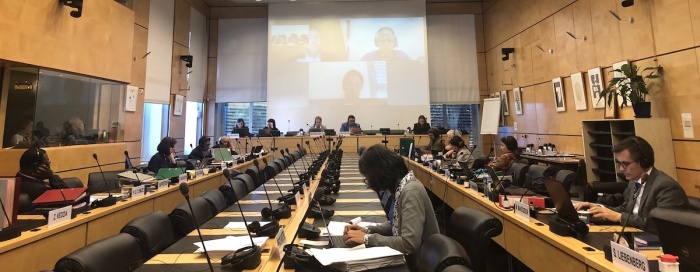On 30 September 2019, Al-Haq participated in a meeting convened between the United Nations (UN) Committee on Economic, Social and Cultural Rights (the ‘Committee’ or ‘CESCR’) and civil society organisations as part of the fourth Periodic Review of the State of Israel under the International Covenant on Economic, Social and Cultural Rights (the ‘Covenant’). The meeting included a number of civil society and human rights organisations to discuss Israel’s ongoing violations of economic, social, and cultural rights against Palestinians within its jurisdiction, i.e., in the Occupied Palestinian Territory (OPT) and Israel, as well as the Syrian population in the occupied Syrian Golan.
Prior to the meeting, on 6 September 2019, Al-Haq, along with Al-Marsad – Arab Human Rights Centre in Golan Heights and Cornell Law School’s International Human Rights Clinic (submitting parties), submitted a joint parallel report to the Committee, focusing on the systemic and manifestly unlawful exploitation of renewable and non-renewable energy resources in the OPT and in the occupied Syrian Golan. The submission further highlighted Israel’s infringements of, inter alia, the right to self-determination and permanent sovereignty over natural resources for both occupied people, as well as the involvement of business enterprises in these violations.[1]
During the meeting with the Committee, Al-Haq reiterated recommendations made in the joint written parallel report, reaffirming Israel’s continued failure to respect, protect, and fulfil the rights enshrined in the Covenant for the occupied Palestinian people, and systemic measures and policies of land confiscation, movement restrictions, house and property demolitions, displacement and transfer of the occupied population, which ultimately seek to erase Palestinian presence through demographic engineering and the expansion of Israel’s illegal settlement enterprise. Al-Haq specifically highlighted Israel’s policies and measures to deny and prevent the occupied Palestinian people access and control over their land and natural resources in the OPT, and the role of private actors, including agencies and business enterprises, in the unlawful exploitation of Palestinian resources for the benefit of the Israeli economy and its settlement enterprise, thus sustaining Israel’s prolonged military occupation and making it profitable. Al-Haq highlighted that business enterprises have benefited from the occupation and lack of accountability for their involvement in serious human rights abuses in their operations and relationships in the OPT. This has obstructed and denied the occupied Palestinian people sovereignty over natural wealth and resources, pursuit of economic development, and forced them into an entrenched dependency on aid, thereby creating a captive market.
Al-Haq urged the Committee to acknowledge the role of private actors in infringing upon the social, economic, and cultural rights of the occupied population, as the Committee has done previously in other contexts, including Congo, Madagascar, and Cambodia. Furthermore, Al-Haq urged the Committee to:
- Call on Israel to fulfil its obligations towards the occupied population under international human rights law and international humanitarian law, notably with regards to the right to self-determination and permanent sovereignty over natural resources;
- Halt all discriminatory policies and practices, especially land confiscation, closure, and movement restrictions imposed on the Palestinian people, and stop providing incentives for businesses to operate in and with illegal Israeli settlements;
- Cease authorizing and encouraging Israeli and multinational business enterprises from engaging in activities in occupied territories that directly and indirectly result in serious and systemic human rights abuses against the occupied peoples, their property, and resources; and
- Ensure that such business activity is fully in line with its obligations, as occupying Power, under international human rights law and international humanitarian law, as well as principles of corporate responsibility under international law.
Meanwhile, civil society organisations addressed other pertinent violations under the Covenant against the Palestinian people within Israel’s jurisdiction, including: house demolitions, the revocation of the permanent residency status of Palestinians in Jerusalem, the unlawful 12-year Israeli imposed closure of the Gaza Strip, which amounts to collective punishment, and the ramifications of Israel’s Nation-State Law on the inalienable rights of the Palestinian people.
In a follow up written submission sent on 8 October 2019, responding to the Committee members’ questions during the meeting held on 30 September, Al-Haq elaborated on Israel’s intentional failure to guarantee the Palestinian people effective judicial remedies for violations committed against them, the tangible implications of Israel’s racist Nation-State Law for the non-Jewish population of Israel, Israel’s imposed closure of the Gaza Strip, which has made Gaza uninhabitable, and other movement and access restrictions across the OPT, which have had a detrimental impact on the right to health and access to medical care for the occupied Palestinian population. In the follow-up responses submitted to the Committee, Al-Haq urged CESCR to reiterate and adopt the recommendations of the UN Commission of Inquiry on the Great Return March, including to call on Israel, as occupying Power, to lift its illegal closure of the Gaza Strip with immediate effect. Ultimately, Al-Haq called on the Committee to recognise that Israel’s prolonged occupation is incompatible with its obligations under the Covenant to uphold the right of the Palestinian people to self-determination.
ENDS
[1] See full list of recommendations at: Al-Haq, ‘Joint Submission to UN Committee on Economic, Social and Cultural Rights ahead of Israel’s Fourth Periodic Review’ (11 September 2019) available at: http://www.alhaq.org/advocacy/15138.html


